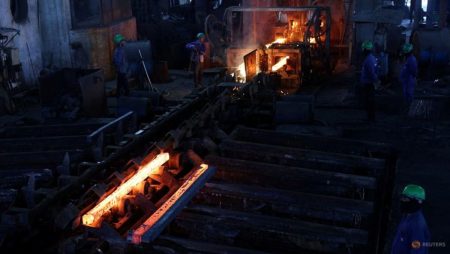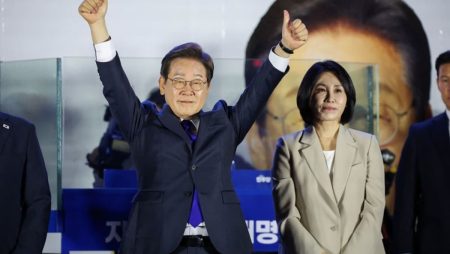The South Korean political landscape is embroiled in a high-stakes power struggle following a failed impeachment attempt against President Yoon Suk Yeol. The main opposition Democratic Party, led by Lee Jae-myung, initiated the impeachment proceedings, accusing Yoon of various offenses, though the specific charges weren’t detailed in the provided text. Despite falling short of the required votes in the National Assembly, the Democratic Party has vowed to relentlessly pursue impeachment, signaling a protracted period of political instability and uncertainty. This unwavering stance sets the stage for a fierce battle between the ruling and opposition parties, further polarizing the nation’s political discourse.
Lee Jae-myung’s resolute commitment to impeaching President Yoon, even after the initial setback, underscores the deep divisions within South Korean politics. His public apology for not achieving the desired outcome – the successful impeachment of Yoon – suggests a recognition of public sentiment favoring the president’s removal. This apology, however, is coupled with a firm promise to continue the impeachment efforts, indicating a strategic calculation to maintain pressure on the ruling party and capitalize on public discontent. The Democratic Party’s persistence could further galvanize its base and potentially sway public opinion against Yoon, setting the stage for future political confrontations.
The ruling People Power Party, while acknowledging the seriousness of the political crisis, has advocated for a more measured approach. Rejecting the opposition’s aggressive pursuit of impeachment, the ruling party emphasizes the need for a more “orderly and responsible” resolution. This stance likely reflects a desire to avoid further escalating political tensions and to project an image of stability and pragmatism. The clashing approaches of the two parties highlight the fundamental differences in their political strategies and priorities, further complicating the prospects for a swift and amicable resolution.
The failed impeachment vote underscores the challenges facing the Democratic Party in achieving its objective. The vote, falling short of the required two-thirds majority, reveals the limitations of the opposition’s influence within the National Assembly. This failure could be attributed to several factors, including insufficient support from other opposition parties or wavering within their own ranks. The significant gap between the votes cast and the threshold required for impeachment underscores the uphill battle the Democratic Party faces in mustering enough support to remove President Yoon from office.
The political turmoil in South Korea is not confined to the halls of the National Assembly. The Democratic Party’s vow to continue impeachment proceedings is likely to energize ongoing public protests against President Yoon’s administration. These demonstrations, coupled with the opposition’s persistent impeachment efforts, could further destabilize the political environment and create a climate of uncertainty. The confluence of parliamentary maneuvering and public protests signifies a broader societal dissatisfaction with the current political leadership, potentially leading to a protracted period of political instability.
The failed impeachment vote and the subsequent political maneuvering have placed South Korea at a critical juncture. The Democratic Party’s unwavering commitment to impeachment, coupled with the ruling party’s call for a more measured approach, has created a highly charged political atmosphere. The ongoing protests and the deep divisions within the National Assembly point to a prolonged period of political uncertainty, with potential ramifications for the country’s stability and future direction. The unfolding political drama in South Korea warrants close observation, as it could have significant implications for the country’s domestic and foreign policy agendas.










